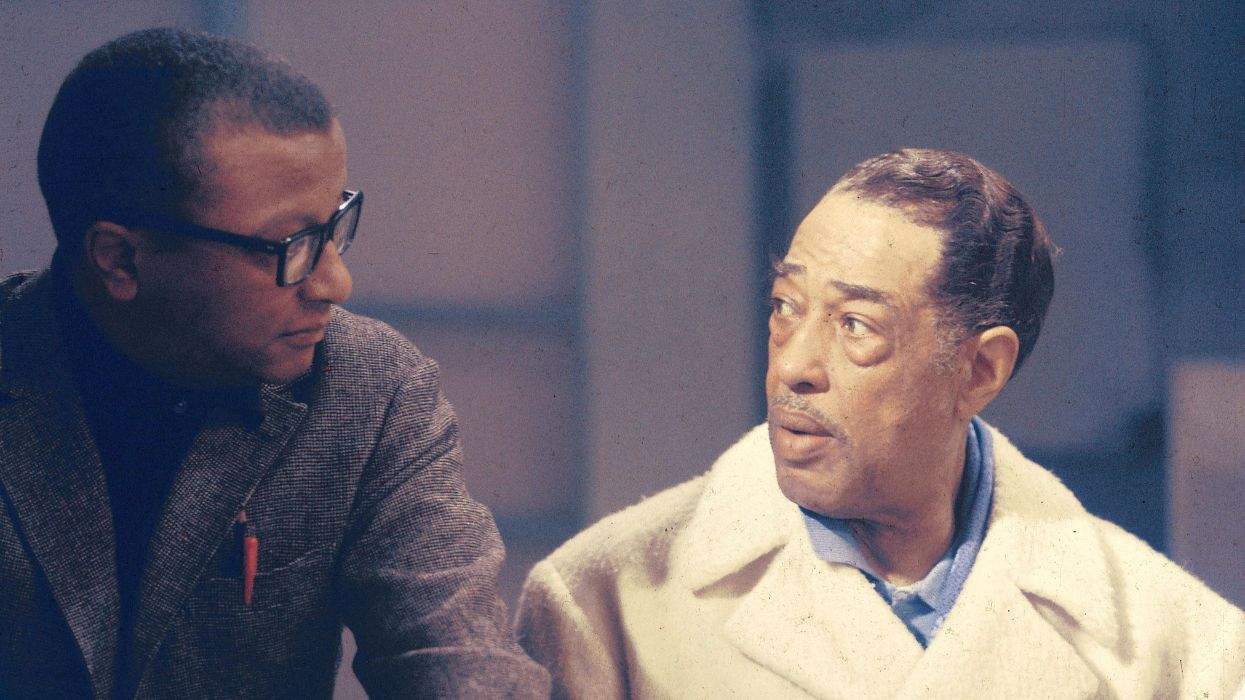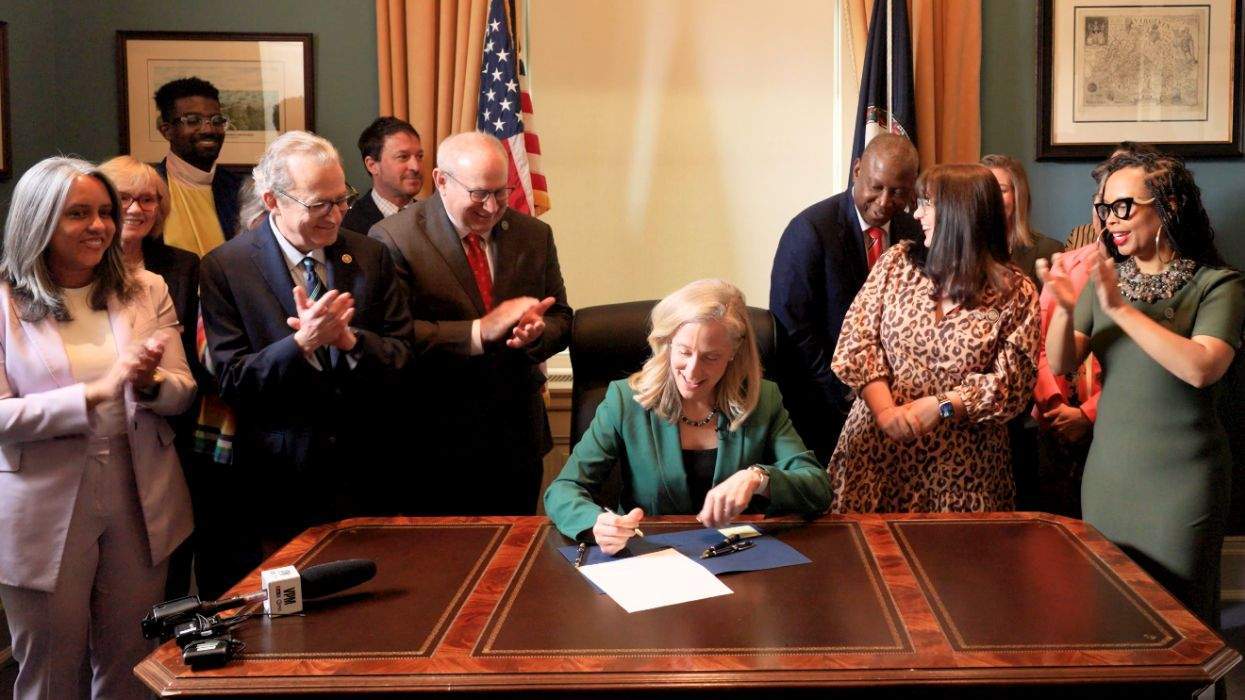Supreme Court Justice Ruth Bader Ginsburg, a champion of civil rights for LGBTQ+ people, women, and many others, has died at age 87.
Ginsburg died Friday evening at her home in Washington, D.C., of complications from recurring pancreatic cancer, according to a news release from the court.
Appointed by President Bill Clinton in 1993, she was the second woman to serve on the high court, after Sandra Day O'Connor.
Her death raises fears that any replacement appointed by Donald Trump will increase the court's conservative majority. She was one of four reliably liberal justices, with Stephen Breyer, Elena Kagan, and Sonia Sotomayor.
A few days ago, she had dictated this statement to her granddaughter Clara Sera: "My most fervent wish is that I will not be replaced until a new president is installed."
"She knew what was to come," NPR notes. "Ginsburg's death will have profound consequences for the court and the country. Inside the court, not only is the leader of the liberal wing gone, but with the Court about to open a new term, Chief Justice John Roberts no longer holds the controlling vote in closely contested cases." And Trump is expected to put forth a nominee soon, sources told ABC News.
And Senate Majority Leader Mitch McConnell, a Republican, said there will be a vote on a nominee, even though he denied a vote to President Barack Obama's nominee Merrick Garland in 2016 because it was an election year. Garland would have replaced Justice Antonin Scalia, a conservative icon, who died in February of that year.
Ginsburg joined in all the court's major pro-LGBTQ+ rulings during her tenure: 1996's Romer v. Evans, which struck down Colorado's Amendment 2, a voter-passed measure that prevented the state or any of its cities and counties from banning discrimination based on sexual orientation; 2003's Lawrence v. Texas, which struck down all remaining state antisodomy laws; 2013's U.S. v. Windsor, invalidating the Defense of Marriage Act section that denied federal government recognition to same-sex marriages; Hollingsworth v. Perry, also in 2013, which ended California's anti-marriage equality Proposition 8 for good; 2015's Obergefell v. Hodges, establishing marriage equality nationwide; and this year's Bostock v. Clayton County, in which the court ruled that federal law against sex discrimination in employment included discrimination based on sexual orientation and gender identity.
She did not write any of those rulings, that being done in most of the cases by Justice Anthony Kennedy (now retired) and, in the Bostock case, surprisingly by Trump appointee Neil Gorsuch. But she wrote a spirited dissent in the Masterpiece Cakeshop v. Colorado Civil Rights Commission ruling in 2018, in which the court's majority vacated the commission's finding that the shop's owner, Jack Phillips, had violated state antidiscrimination law when he refused to create a custom wedding cake for a same-sex couple, Charlie Craig and David Mullins. The commission hadn't given sufficient respect to Phillips's religious beliefs, the court ruled, and it hadn't sanctioned bakers who refused to make cakes bearing hateful messages.
That was a false equivalency, Ginsburg wrote in her dissent. "Phillips declined to make a cake he found offensive where the offensiveness of the product was determined solely by the identity of the customer requesting it," she said. "The three other bakeries declined to make cakes where their objection to the product was due to the demeaning message the requested product would literally display. ... When a couple contacts a bakery for a wedding cake, the product they are seeking is a cake celebrating their wedding -- not a cake celebrating heterosexual weddings or same-sex weddings -- and that is the service Craig and Mullins were denied."
She also didn't buy the argument that Phillips had been willing to sell other goods to LGBTQ+ customers. "The fact that Phillips might sell other cakes and cookies to gay and lesbian customers was irrelevant to the issue Craig and Mullins' case presented," Ginsburg wrote. "What matters is that Phillips would not provide a good or service to a same-sex couple that he would provide to a heterosexual couple."
She did write a ruling in a lower-profile case with implications for LGBTQ+ rights. In 2010's Martinez v. Christian Legal Society of California, she upheld a university's right to deny recognition to groups that violated the school's antidiscrimination policy. Lack of recognition wouldn't mean the group couldn't exist, but it would mean the organization couldn't receive university funds or use the university logo.
The University of California's Hastings College of the Law in San Francisco expected the Christian Legal Society to adhere to its nondiscrimination policy regarding religion and sexual orientation in order to receive recognition. The group sought an exemption, as it required members to sign a statement of faith including the belief that marriage was strictly a union between a man and a woman, and they could not engage in "unrepentant homosexual conduct."
The group argued that that was not the same as excluding LGBTQ+ people due to their identity, but Ginsburg did not agree, and she said the university did not have to subsidize organizations that discriminate. "Petitioner excludes students who will not sign its Statement of Faith or who engage in 'unrepentant homosexual conduct.' ... The expressive association argument it presses, however, is hardly limited to these facts," she wrote. "Other groups may exclude or mistreat Jews, blacks, and women -- or those who do not share their contempt for Jews, blacks, and women. A free society must tolerate such groups. It need not subsidize them, give them its official imprimatur, or grant them equal access to law school facilities."
Ginsburg wrote many other notable rulings and dissents. In 1996, she wrote the court's majority ruling that struck down Virginia Military Institute's policy of admitting males only. In 1999, she dissented from the court's decision that Lilly Ledbetter could not sue her employer, Goodyear, for sex discrimination because she had not met a deadline to do so (a new law, enacted under Obama, adjusted the deadlines). In 2000, she dissented from the Bush v. Gore ruling that ended recounts in Florida in that presidential race. She also dissented from rulings that undercut the mandate for contraceptive coverage under the Affordable Care Act and undermined the Voting Rights Act.
She first made her name as an attorney arguing against sex discrimination, and she argued cases before the Supreme Court several times before joining it. She broke ground for gender equality under the law and in her own career, becoming the first female tenured professor at Columbia Law School and founding the Women's Rights Project at the American Civil Liberties Union. President Jimmy Carter named her to the U.S. Court of Appeals for the District of Columbia Circuit in 1980.
As a Supreme Court justice, she became something of a pop-culture icon, dubbed the "Notorious RBG." She was the subject of a 2018 documentary, RBG, and in that same year was portrayed by Felicity Jones in a feature film, On the Basis of Sex, which chronicled the beginnings of her career. She was known for officiating same-sex weddings and for her surprising friendship with Scalia, her ideological opposite, who shared her love of opera.
She was long married to lawyer Martin Ginsburg, who died in 2010. He was extremely supportive of her career, and she even delivered a Supreme Court opinion the day after he died, saying, "Marty would have wanted it." She also bounced back from her own health problems, returning to work on the court after five bouts with cancer.
Her survivors include two children, Jane C. Ginsburg and James S. Ginsburg; four grandchildren; two step-grandchildren; and a great-granddaughter.















Charlie Kirk DID say stoning gay people was the 'perfect law' — and these other heinous quotes
These are some of his worst comments about LGBTQ+ people made by Charlie Kirk.